In Exercise 14.1 of Chapter 14, we shall study some definitions and discuss problems based on quadratic equations with real coefficients. To help improve conceptual knowledge among students, experts have designed the solutions as per the CBSE guidelines. The PDF of RD Sharma Class 11 Solutions is provided here. Students should practise the solutions on a daily basis to achieve their goals of scoring high marks in their board exams. Learners can easily access and download the solutions as their study material.
RD Sharma Solutions for Class 11 Maths Exercise 14.1 Chapter 14 – Quadratic Equations
Also, access another exercise of RD Sharma Solutions for Class 11 Maths Chapter 14 – Quadratic Equations
Access answers to RD Sharma Solutions for Class 11 Maths Exercise 14.1 Chapter 14 – Quadratic Equations
Solve the following quadratic equations by factorisation method only:
1. x2 + 1 = 0
Solution:
Given: x2 + 1 = 0
We know, i2 = –1 ⇒ 1 = –i2
By substituting 1 = –i2 in the above equation, we get
x2 – i2 = 0
[By using the formula, a2 – b2 = (a + b) (a – b)](x + i) (x – i) = 0
x + i = 0 or x – i = 0
x = –i or x = i
∴ The roots of the given equation are i, -i
2. 9x2 + 4 = 0
Solution:
Given: 9x2 + 4 = 0
9x2 + 4 × 1 = 0
We know, i2 = –1 ⇒ 1 = –i2
By substituting 1 = –i2 in the above equation, we get
So,
9x2 + 4(–i2) = 0
9x2 – 4i2 = 0
(3x)2 – (2i)2 = 0
[By using the formula, a2 – b2 = (a + b) (a – b)](3x + 2i) (3x – 2i) = 0
3x + 2i = 0 or 3x – 2i = 0
3x = –2i or 3x = 2i
x = -2i/3 or x = 2i/3
∴ The roots of the given equation are 2i/3, -2i/3
3. x2 + 2x + 5 = 0
Solution:
Given: x2 + 2x + 5 = 0
x2 + 2x + 1 + 4 = 0
x2 + 2(x) (1) + 12 + 4 = 0
(x + 1)2 + 4 = 0 [since, (a + b)2 = a2 + 2ab + b2]
(x + 1)2 + 4 × 1 = 0
We know, i2 = –1 ⇒ 1 = –i2
By substituting 1 = –i2 in the above equation, we get
(x + 1)2 + 4(–i2) = 0
(x + 1)2 – 4i2 = 0
(x + 1)2 – (2i)2 = 0
[By using the formula, a2 – b2 = (a + b) (a – b)](x + 1 + 2i)(x + 1 – 2i) = 0
x + 1 + 2i = 0 or x + 1 – 2i = 0
x = –1 – 2i or x = –1 + 2i
∴ The roots of the given equation are -1+2i, -1-2i
4. 4x2 – 12x + 25 = 0
Solution:
Given: 4x2 – 12x + 25 = 0
4x2 – 12x + 9 + 16 = 0
(2x)2 – 2(2x)(3) + 32 + 16 = 0
(2x – 3)2 + 16 = 0 [Since, (a + b)2 = a2 + 2ab + b2]
(2x – 3)2 + 16 × 1 = 0
We know, i2 = –1 ⇒ 1 = –i2
By substituting 1 = –i2 in the above equation, we get
(2x – 3)2 + 16(–i2) = 0
(2x – 3)2 – 16i2 = 0
(2x – 3)2 – (4i)2 = 0
[By using the formula, a2 – b2 = (a + b) (a – b)](2x – 3 + 4i) (2x – 3 – 4i) = 0
2x – 3 + 4i = 0 or 2x – 3 – 4i = 0
2x = 3 – 4i or 2x = 3 + 4i
x = 3/2 – 2i or x = 3/2 + 2i
∴ The roots of the given equation are 3/2 + 2i, 3/2 – 2i
5. x2 + x + 1 = 0
Solution:
Given: x2 + x + 1 = 0
x2 + x + ¼ + ¾ = 0
x2 + 2 (x) (1/2) + (1/2)2 + ¾ = 0
(x + 1/2)2 + ¾ = 0 [Since, (a + b)2 = a2 + 2ab + b2]
(x + 1/2)2 + ¾ × 1 = 0
We know, i2 = –1 ⇒ 1 = –i2
By substituting 1 = –i2 in the above equation, we get
(x + ½)2 + ¾ (-1)2 = 0
(x + ½)2 + ¾ i2 = 0
(x + ½)2 – (√3i/2)2 = 0
[By using the formula, a2 – b2 = (a + b) (a – b)](x + ½ + √3i/2) (x + ½ – √3i/2) = 0
(x + ½ + √3i/2) = 0 or (x + ½ – √3i/2) = 0
x = -1/2 – √3i/2 or x = -1/2 + √3i/2
∴ The roots of the given equation are -1/2 + √3i/2, -1/2 – √3i/2
6. 4x2 + 1 = 0
Solution:
Given: 4x2 + 1 = 0
We know, i2 = –1 ⇒ 1 = –i2
By substituting 1 = –i2 in the above equation, we get
4x2 – i2 = 0
(2x)2 – i2 = 0
[By using the formula, a2 – b2 = (a + b) (a – b)](2x + i) (2x – i) = 0
2x + i = 0 or 2x – i = 0
2x = –i or 2x = i
x = -i/2 or x = i/2
∴ The roots of the given equation are i/2, -i/2
7. x2 – 4x + 7 = 0
Solution:
Given: x2 – 4x + 7 = 0
x2 – 4x + 4 + 3 = 0
x2 – 2(x) (2) + 22 + 3 = 0
(x – 2)2 + 3 = 0 [Since, (a – b)2 = a2 – 2ab + b2]
(x – 2)2 + 3 × 1 = 0
We know, i2 = –1 ⇒ 1 = –i2
By substituting 1 = –i2 in the above equation, we get
(x – 2)2 + 3(–i2) = 0
(x – 2)2 – 3i2 = 0
(x – 2)2 – (√3i)2 = 0
[By using the formula, a2 – b2 = (a + b) (a – b)](x – 2 + √3i) (x – 2 – √3i) = 0
(x – 2 + √3i) = 0 or (x – 2 – √3i) = 0
x = 2 – √3i or x = 2 + √3i
x = 2 ± √3i
∴ The roots of the given equation are 2 ± √3i
8. x2 + 2x + 2 = 0
Solution:
Given: x2 + 2x + 2 = 0
x2 + 2x + 1 + 1 = 0
x2 + 2(x)(1) + 12 + 1 = 0
(x + 1)2 + 1 = 0 [∵ (a + b)2 = a2 + 2ab + b2]
We know, i2 = –1 ⇒ 1 = –i2
By substituting 1 = –i2 in the above equation, we get
(x + 1)2 + (–i2) = 0
(x + 1)2 – i2 = 0
(x + 1)2 – (i)2 = 0
[By using the formula, a2 – b2 = (a + b) (a – b)](x + 1 + i) (x + 1 – i) = 0
x + 1 + i = 0 or x + 1 – i = 0
x = –1 – i or x = –1 + i
x = -1 ± i
∴ The roots of the given equation are -1 ± i
9. 5x2 – 6x + 2 = 0
Solution:
Given: 5x2 – 6x + 2 = 0
We shall apply the discriminant rule.
Where, x = (-b ±√(b2 – 4ac))/2a
Here, a = 5, b = -6, c = 2
So,
x = (-(-6) ±√(-62 – 4 (5)(2)))/ 2(5)
= (6 ± √(36-40))/10
= (6 ± √(-4))/10
= (6 ± √4(-1))/10
We have i2 = –1
By substituting –1 = i2 in the above equation, we get
x = (6 ± √4i2)/10
= (6 ± 2i)/10
= 2(3±i)/10
= (3±i)/5
x = 3/5 ± i/5
∴ The roots of the given equation are 3/5 ± i/5
10. 21x2 + 9x + 1 = 0
Solution:
Given: 21x2 + 9x + 1 = 0
We shall apply the discriminant rule.
Where, x = (-b ±√(b2 – 4ac))/2a
Here, a = 21, b = 9, c = 1
So,
x = (-9 ±√(92 – 4 (21)(1)))/ 2(21)
= (-9 ± √(81-84))/42
= (-9 ± √(-3))/42
= (-9 ± √3(-1))/42
We have i2 = –1
By substituting –1 = i2 in the above equation, we get
x = (-9 ± √3i2)/42
= (-9 ± √(√3i)2/42
= (-9 ± √3i)/42
= -9/42 ± √3i/42
= -3/14 ± √3i/42
∴ The roots of the given equation are -3/14 ± √3i/42
11. x2 – x + 1 = 0
Solution:
Given: x2 – x + 1 = 0
x2 – x + ¼ + ¾ = 0
x2 – 2 (x) (1/2) + (1/2)2 + ¾ = 0
(x – 1/2)2 + ¾ = 0 [Since, (a + b)2 = a2 + 2ab + b2]
(x – 1/2)2 + ¾ × 1 = 0
We know, i2 = –1 ⇒ 1 = –i2
By substituting 1 = –i2 in the above equation, we get
(x – ½)2 + ¾ (-1)2 = 0
(x – ½)2 + ¾ (-i)2 = 0
(x – ½)2 – (√3i/2)2 = 0
[By using the formula, a2 – b2 = (a + b) (a – b)](x – ½ + √3i/2) (x – ½ – √3i/2) = 0
(x – ½ + √3i/2) = 0 or (x – ½ – √3i/2) = 0
x = 1/2 – √3i/2 or x = 1/2 + √3i/2
∴ The roots of the given equation are 1/2 + √3i/2, 1/2 – √3i/2
12. x2 + x + 1 = 0
Solution:
Given: x2 + x + 1 = 0
x2 + x + ¼ + ¾ = 0
x2 + 2 (x) (1/2) + (1/2)2 + ¾ = 0
(x + 1/2)2 + ¾ = 0 [Since, (a + b)2 = a2 + 2ab + b2]
(x + 1/2)2 + ¾ × 1 = 0
We know, i2 = –1 ⇒ 1 = –i2
By substituting 1 = –i2 in the above equation, we get
(x + ½)2 + ¾ (-1)2 = 0
(x + ½)2 + ¾ i2 = 0
(x + ½)2 – (√3i/2)2 = 0
[By using the formula, a2 – b2 = (a + b) (a – b)](x + ½ + √3i/2) (x + ½ – √3i/2) = 0
(x + ½ + √3i/2) = 0 or (x + ½ – √3i/2) = 0
x = -1/2 – √3i/2 or x = -1/2 + √3i/2
∴ The roots of the given equation are -1/2 + √3i/2, -1/2 – √3i/2
13. 17x2 – 8x + 1 = 0
Solution:
Given: 17x2 – 8x + 1 = 0
We shall apply the discriminant rule.
Where, x = (-b ±√(b2 – 4ac))/2a
Here, a = 17, b = -8, c = 1
So,
x = (-(-8) ±√(-82 – 4 (17)(1)))/ 2(17)
= (8 ± √(64-68))/34
= (8 ± √(-4))/34
= (8 ± √4(-1))/34
We have i2 = –1
By substituting –1 = i2 in the above equation, we get
x = (8 ± √(2i)2)/34
= (8 ± 2i)/34
= 2(4±i)/34
= (4±i)/17
x = 4/17 ± i/17
∴ The roots of the given equation are 4/17 ± i/17
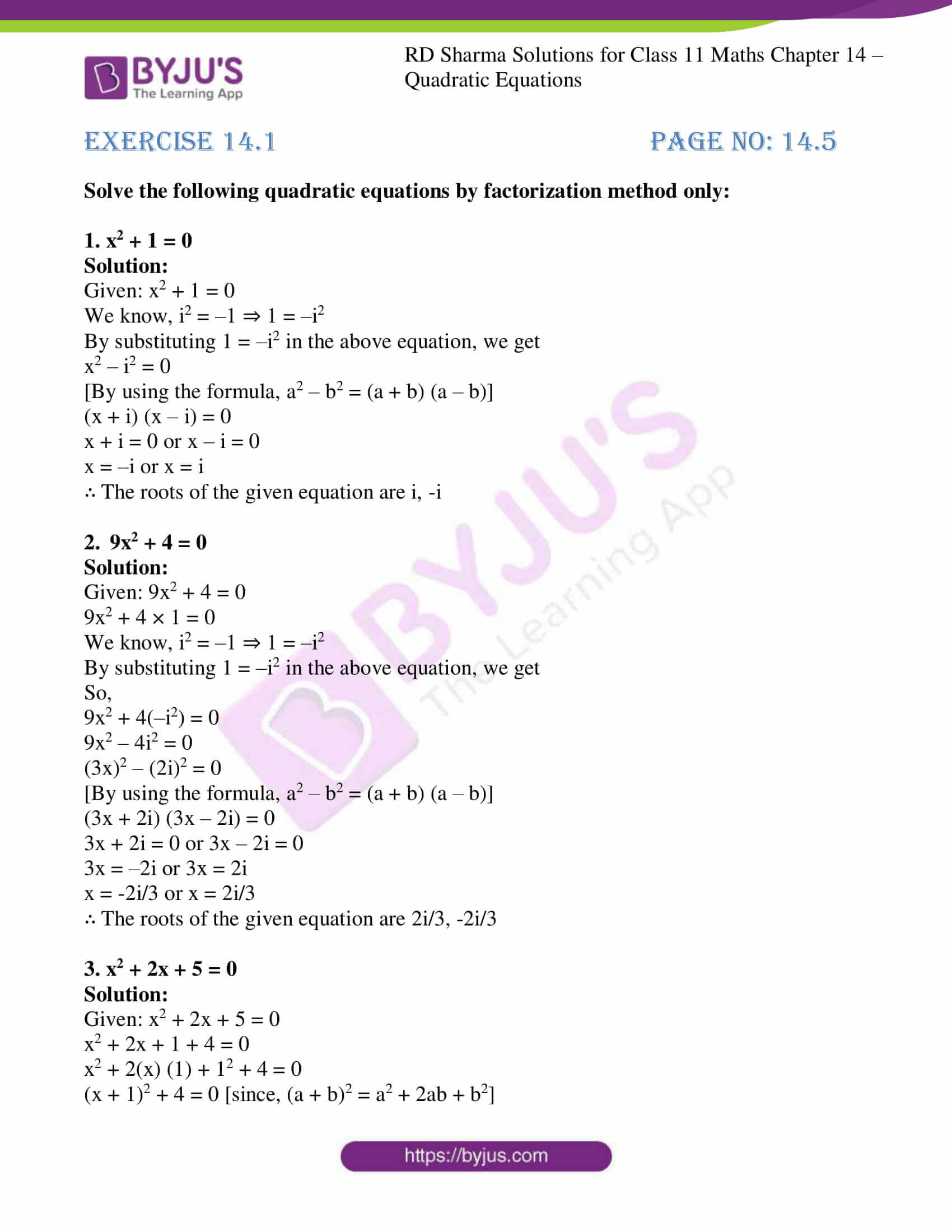
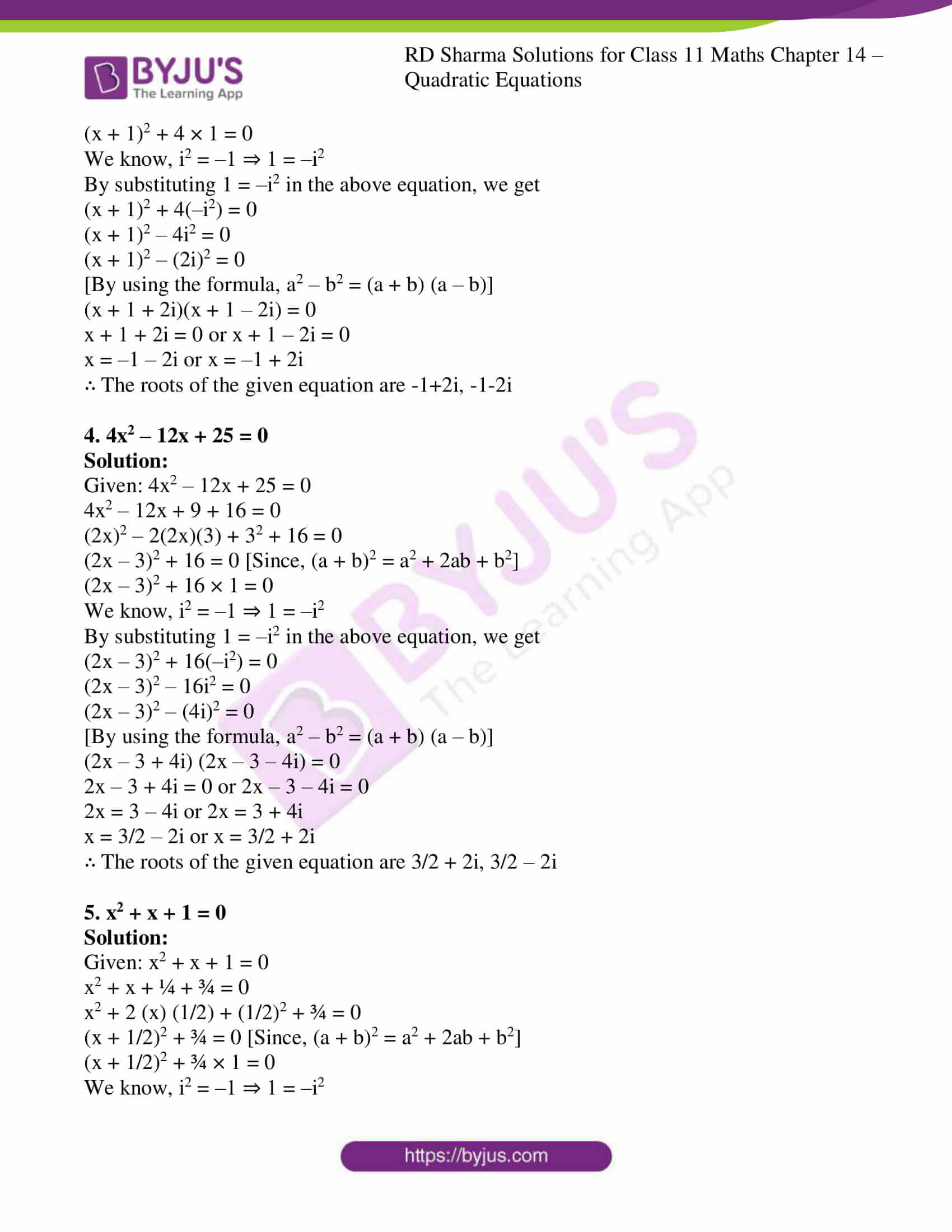
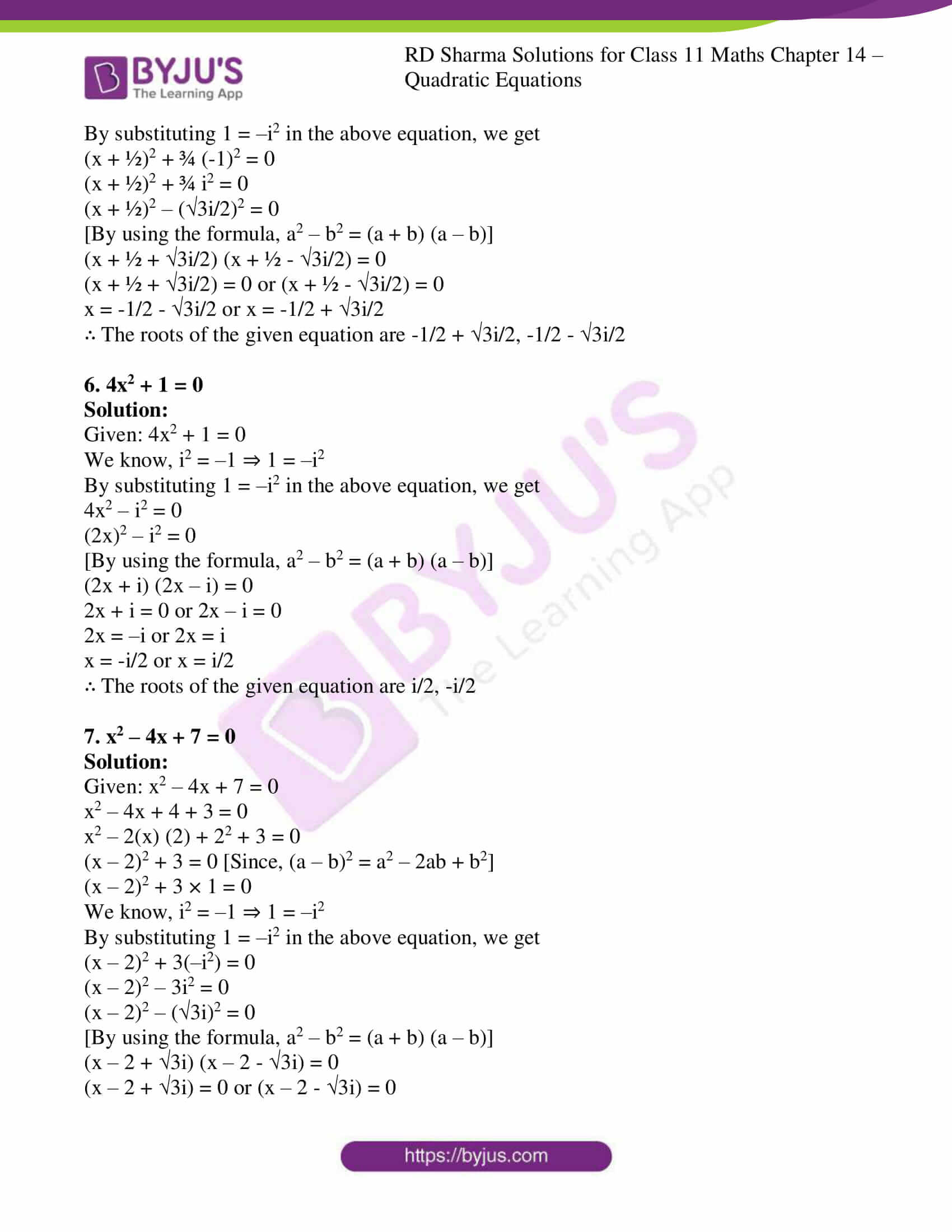
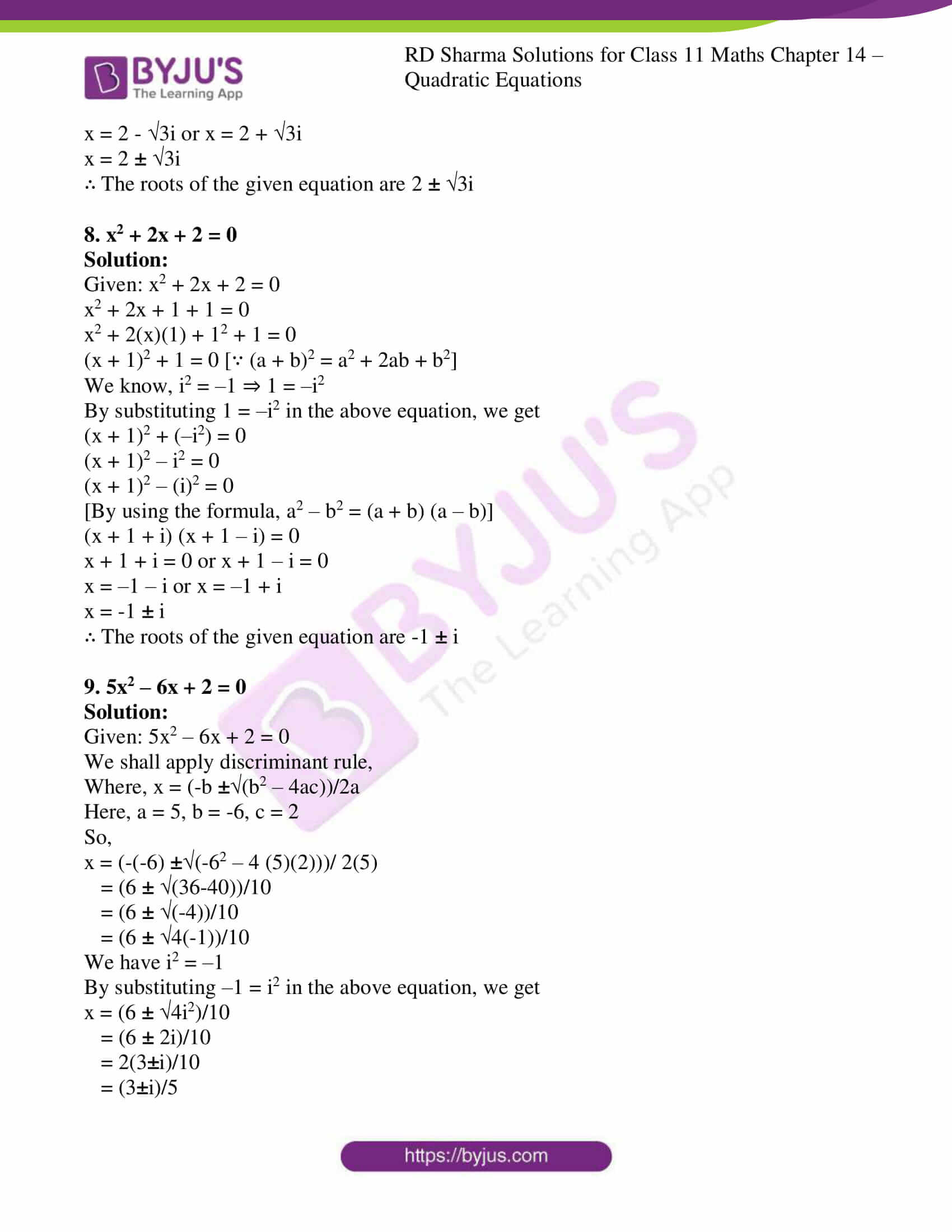
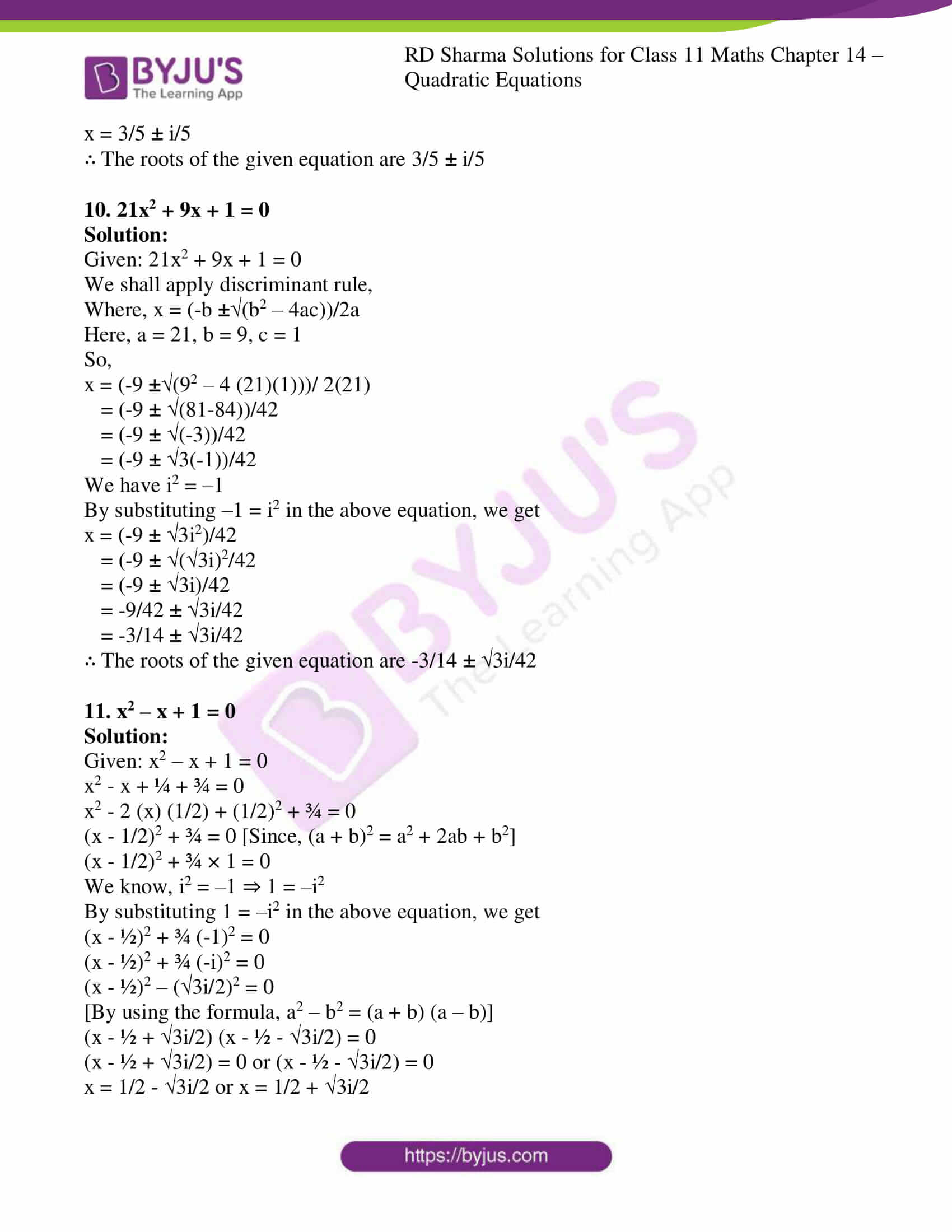
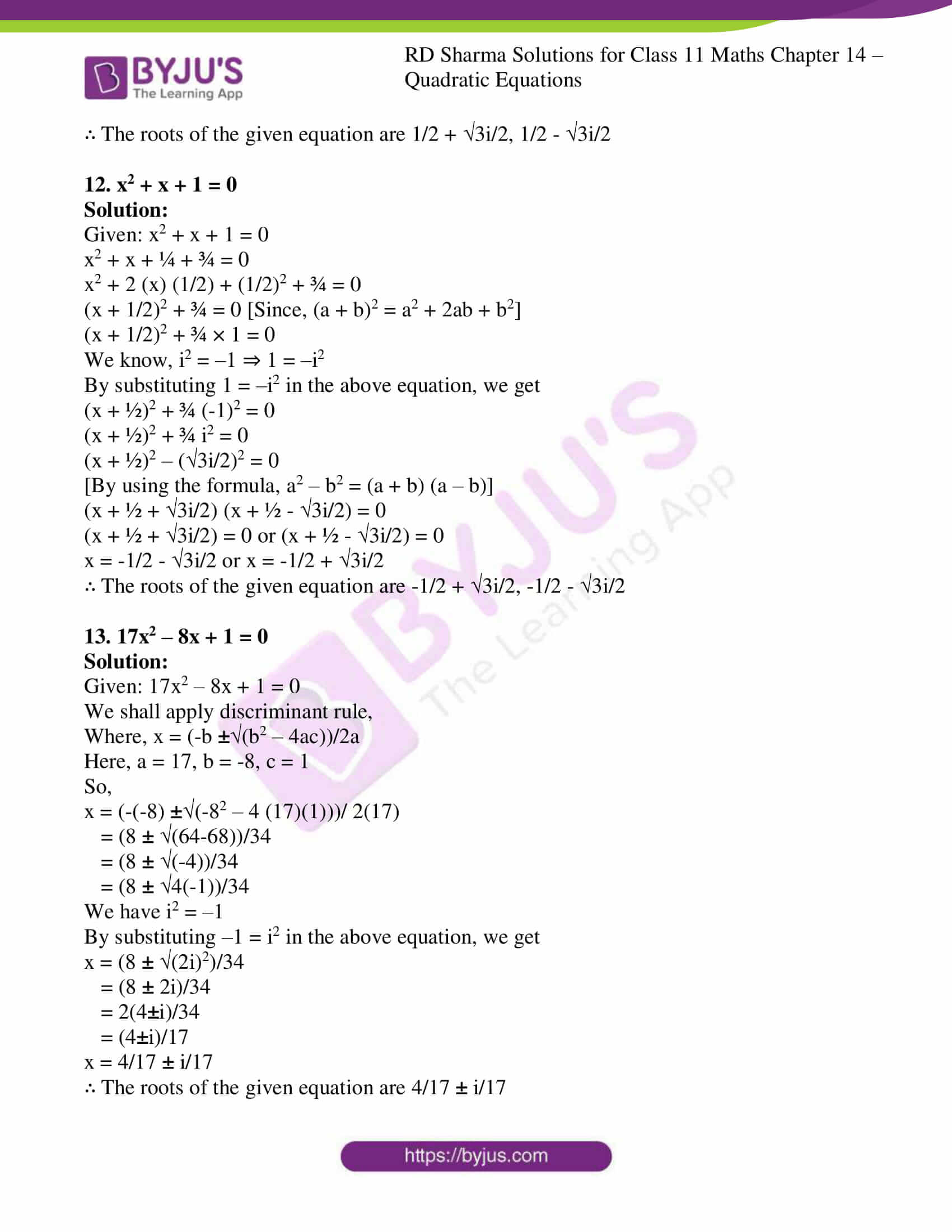
Comments